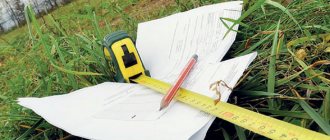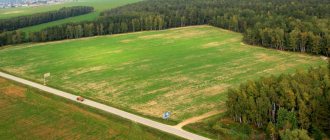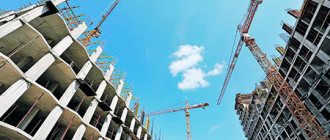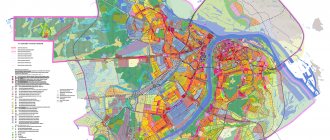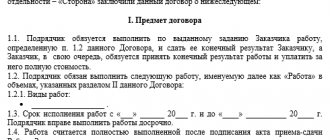What is construction expertise?
Construction examination is a type of forensic engineering and technical examination, a procedural action that consists of two stages: examination of the construction site and preparation of an opinion on the issues raised by the competent authorities. The research base is scientific knowledge and practical observations of highly qualified specialists in the construction industry.
Most often, construction expertise is one of the ways to resolve the conflict between the developer and the customer. The customer wants to make sure that the construction and installation work performed by the developer is carried out completely and in compliance with all standards. He himself does not have the necessary knowledge, but a construction expert does. An expert's conclusions can be a significant help in court proceedings.
When is a construction inspection appointed?
In cases where the investigation and trial of criminal and civil cases require special knowledge in the field of design, construction, operation and repair of buildings and structures.
An interested party (plaintiff/defendant) or the prosecutor's office can order a construction examination. The court can also initiate investigations.
The need to use special knowledge arises:
- when resolving disputes regarding ownership of real estate;
- when considering disputes arising from construction contracts;
- to determine the types, volume, quality and cost of construction work performed, buildings, structures and structures being erected and operated;
- in the investigation of cases of administrative offenses related to establishing the correctness and legality of construction and operation of construction projects;
- in establishing the causes and magnitude of material damage caused to residential buildings and apartments as a result of improper construction or operation of engineering systems;
- in the investigation and trial of criminal cases regarding accidents, breakdowns and destruction in construction;
- to establish compliance with the requirements of special norms and rules governing the processes of design, construction, operation, reconstruction (repair), dismantling and disposal of construction projects.
Why is construction and technical expertise carried out in court and pre-trial procedures?
Carrying out an independent construction examination, the result of which can subsequently be used in legal proceedings, is necessary to determine:
- Quality, volume of repair and construction work.
- Costs of construction and repair work.
- The quality of materials used in construction and repair and finishing work.
- The reasons that could lead to the destruction of an immovable object, the mechanisms of their occurrence.
- Parts belonging to the owners during shared construction.
The object of the examination is the fact of establishing cause-and-effect relationships of construction, determining possible violations committed during the construction of a real estate object, compliance or non-compliance with technical and construction standards, assessment of the volume of actual work performed, their cost, study of estimates, as well as other construction documentation.
What is the object of construction expertise?
Almost any building structure, as well as unfinished construction projects, courtyard areas, utilities, design and as-built documentation, estimates.
The expert determines:
- quality of work performed: identifying defects, defects and violations, predicting their possible consequences;
- compliance with GOST, fire, environmental, sanitary and epidemiological standards, clauses of the agreement concluded between the parties;
- degree of wear and tear of the building;
- the amount of damage caused by a flood or fire, recording the volumes and calculating the cost of restoration;
- the correctness of the redevelopment of the building, including the superstructure and deepening of the basement;
- reasons for roof leaks and mold formation on structures;
- causes of accidents in utilities.
The expert can also conduct geodetic monitoring of deformations, control measurements of premises, examination of load-bearing structures, etc.
Kinds
STE is divided into several types depending on the construction stage.
Preparatory
At this stage the following is carried out :
- Checking project documentation. They evaluate whether the project is drawn up correctly and whether there are errors or violations in it.
- Examination of estimate documentation. Allows you to determine whether the calculations were carried out correctly.
Construction phase
Here they analyze the quality of the construction work performed, what building materials were used, how well the work was carried out, whether they comply with the requirements established in the contract, project, and legislation.
They justify the need to use specific building structures, materials and adopted engineering and technical solutions.
Operational
Analysis of the technical condition of the building. The actual parameters of the structure, the presence of defects, its suitability and readiness for operation are examined and assessed.
Examine:
- Foundation.
- Facade.
- Walls.
- Engineering diagrams.
- Lines of communication.
- Roofing.
After conducting this examination, it will become clear:
- Does the property require reconstruction or additional work?
- Is it necessary to redevelop or change its purpose?
- How safe the building is for others.
Cost and volume of construction and installation work performed
The main task is to assess the total costs of construction, the reasonableness of the costs and construction materials involved, as well as the damage and the cost of its elimination.
A separate type is the examination of the previous conclusion made by an expert. Carried out to double-check or supplement previously obtained data.
What competencies should an expert have?
The main requirement for an expert (see Federal Law No. 73-FZ of May 31, 2001) is the presence of a higher education with a specialty (special knowledge) corresponding to the profile of the examination being performed.
Construction expertise must be carried out by a professional with a higher education as a civil engineer. He must confirm his education with a diploma (not a certificate, not a certificate, not a certificate).
A construction expert must have the skills to conduct instrumental research. During the research process, he can carry out measurements, ultrasonic flaw detection, television assessment, and work with samples taken at the site in the laboratory.
Before instrumental measurements, the expert conducts a visual inspection of the building:
- inspection and identification of visible defects and damage to the building;
- photographic recording of identified defects.
What questions are asked to experts?
Correct and correct formulation of the question by experts is the cornerstone in effective research and subsequent conclusions.
For example, the wording could be:
- What is the technical condition of the structural elements, to establish the category of technical condition of an apartment building?
- Is an apartment building in disrepair?
- What is the wear and tear percentage of a residential apartment building?
- Is it possible to continue living in this residential building? Doesn’t this create a danger for others and for those living in this residential building?
What regulatory documents do construction experts mainly use?
As a rule, these are technical regulatory documents:
- SP 13-102-2003. Rules for inspection of load-bearing structures of buildings and structures.
- GOST 31937-2011. Buildings and constructions. Rules for inspection and monitoring of technical condition.
- MDS 13-20.2004. Comprehensive methodology for inspection and energy audit of reconstructed buildings. Design Guide.
- MRR 2.2.07-98. Methodology for examining buildings and structures during their reconstruction and redevelopment, etc.
One of the largest and most knowledge-intensive types of expert activity is construction and technical expertise, the subject of research of which is capital construction projects for various purposes.
The construction industry is a rather complex organism in which many participants interact to achieve a common goal - customers, developers, contractors, design and survey firms. During the process of construction, major repairs or reconstruction of a facility, controversial situations often arise between them, which the examination is intended to resolve.
Often, not only the buildings under construction themselves are subject to inspection, but also construction documentation, communications, geology and geodesy of the sites. In this regard, we list the main areas of construction and technical expertise (Figure 1).
| DIRECTIONS OF CONSTRUCTION AND TECHNICAL EXAMINATION | ||
1. CONSTRUCTION
| 6. ISSUES OF OPERATION AND REPAIR of all listed objects and housing and communal services infrastructure | |
| 2. SPECIFIC TYPES OF WORK during the construction of buildings and structures | 7. ACCIDENTS AND EMERGENCIES | |
| 3. CONSTRUCTION TECHNOLOGY | 8. LAND MANAGEMENT (since all capital construction projects are inextricably linked to the land) | |
| 4. PRICING IN CONSTRUCTION | 9. SAFETY IN CONSTRUCTION | |
| 5. DESIGN ISSUES (quality of design and working documentation) | 10. CONSTRUCTION / TECHNICAL SUPERVISION OF CONSTRUCTION | |
Fig.1. Areas of construction and technical expertise
Currently, specialists from both state and non-state expert institutions, which include experienced and professional specialists, have the right to conduct construction and technical examinations. In this regard, construction and technical expertise can be of the nature of judicial or extrajudicial independent research, depending on the method of its appointment.
Forensic examination refers to the conduct of research on issues posed to an expert by a court, and a document reflecting the progress and results of the research conducted by an expert is called an expert opinion.
In the case of forensic examination, the main regulations defining the legal basis and principles of conducting the examination are: Federal Law “On State Forensic Activities in the Russian Federation”, No. 73-FZ of May 31, 2001 and Federal Law “On Valuation Activities in the Russian Federation”, No. 135-FZ dated July 29, 1998. (if it is necessary to establish the market or other value of an object), as well as the production of a forensic examination is regulated by the relevant procedural legislation of the Russian Federation, a set of which is presented in Table 1.
Table 1
Set of basic regulatory and legal aspects of forensic examinations
| Legal act | Code of Criminal Procedure of the Russian Federation | Code of Civil Procedure of the Russian Federation | Agroindustrial complex of the Russian Federation | Code of Administrative Offenses | Criminal Code of the Russian Federation |
| Concept, rights and responsibilities of an expert | Art.57 | Art.85 | Art.55 | Art.25.9 | |
| Grounds and procedure for appointing an examination | Article 159 | Art.79,80 | Art.82 | Article 26.4 | |
| Expert's responsibility | Art.57 | Art.80 | Art.55 | Art.25.9 | Article 307,310,285,290 |
| The procedure for conducting the examination | Article 283 | Art.84 | Art.83 | ||
| Appointment of a repeated (additional) examination | Article 207 | Art.87 | Art.87 | ||
| Expert opinion | Art.80,204,206 | Art.86 | Art.56 | Article 26.4 | |
| Summoning an expert to court | Art. 205,282 | Art. 187 | Art.74,86,157 | Art.25.9 | |
| Recusal of an expert | Art.62,70 | vv.16,21 | vv.8,23-26 | Art.25.12,25.13 |
As for the extrajudicial examination, its customer can be either an individual or a legal entity who intends to resolve the dispute out of court.
Currently, the legislation does not regulate the procedure for conducting extrajudicial examinations. In this regard, there are various names of documents reflecting the result of this type of construction examination. It is currently recommended to call the results of an extrajudicial examination a specialist’s opinion, since only this name is fixed by law (Article 80 of the Code of Criminal Procedure of the Russian Federation).
In a general sense, construction and technical examination of buildings and structures is the establishment of compliance of real estate objects and their parts with the mandatory requirements of regulatory legal acts of the Russian Federation, technical regulations, SNiP, GOST, compliance with the requirements of which ensures the proper quality of construction and the safety of building structures during their operation.
In the process of construction and technical expertise, a set of activities is carried out, including research, calculations and conclusions, which are the basis for making qualified decisions. It is carried out in the following cases:
- during scheduled and extraordinary inspections, or during a complete technical inspection of objects (to monitor the condition of the building);
- before major repairs or re-equipment (to monitor the current condition of the facility during the pre-repair period and determine the nature of future work);
- after major repairs or reconstruction to control the quality of work, as well as the general technical condition of the building;
- in case of structural damage and accidents (performs the function of damage control and allows you to predict the further operation of the building);
- to assess the condition of an object during the purchase and sale process;
- to carry out and implement the tasks of construction control and technical supervision;
- in order to establish the causes of structural defects that may arise both during the construction and operation of buildings and structures.
To effectively obtain the data of interest to the customer, regardless of the object of examination, the complexity of the work being carried out and the issues intended to be resolved by construction and technical examination, during its implementation various methods and technologies are used, including:
- technical and legal monitoring of various documentation with assessment of compliance of all provisions of the engineering project, estimate or contract with current standards and generally accepted contractual principles;
- a comprehensive inspection of objects, the purpose of which is to record obvious defects;
- carrying out the necessary measurements;
- non-destructive testing methods - ultrasonic flaw detection, thermal imaging assessment, examination of materials with penetrating compounds, etc.;
- laboratory studies of samples of concrete, soil, wood, steel structures, which are taken directly at the site;
- field tests carried out using mechanical impact on individual sections of a building or structure;
- monitoring of formed cracks by placing beacons in problem areas;
- study of individual elements - foundation, roofing systems, floors, walls, floor slabs, staircases;
- conducting surveys on land plots, including analysis of groundwater, landscape faults, and soil characteristics.
In addition, construction expertise may include computer modeling methods using special programs (for example, SCAD), which allow one to calculate various loads, the reliability of components and connections, structural strength, and optimal angles.
Depending on the assigned tasks, the content of work on construction and technical expertise of buildings and structures includes the following main stages, schematically depicted in Figure 2.
Fig.2 Main stages of construction and technical expertise
Construction and technical expertise begins with the review of the necessary documentation for its compliance and completeness of the data necessary for conducting research. Depending on the tasks assigned, such documentation may include: pre-contractual (tender documentation); contractual (agreements with all integral annexes); design and estimate, which includes all stages of design work; reporting (acts of completed work, accounting); executive (drawings, diagrams); production and other types of documentation.
The main task of the preliminary examination (visual examination) of buildings and structures is to determine the general condition of building structures, the composition of the planned work and the collection of initial data necessary for drawing up technical specifications for a detailed instrumental examination. According to statistics, up to 80% of defects are detected thanks to visual examination.
However, only the results of an instrumental examination make it possible to make an informed decision on the condition of the object, therefore, after the preliminary examination, the stage of a detailed instrumental examination of structures begins. As part of such a study, measurements of the actual dimensions and other geometric parameters of building elements and structures are carried out, their compliance with the design is determined, deformations and deflections of load-bearing structures, settlement of foundations, etc. are measured. After this, the physical and technical characteristics of the materials of the structures being examined are determined in laboratory conditions and generalization of the results of construction and technical expertise.
The final stage is the preparation and delivery to the customer of an expert report, which contains information about the examination and conclusions about the technical condition of the object under study, the results of instrumental technical examination, drawings, photographs, conclusions about the actual technical condition and recommendations for further operation.
When preparing a specialist’s report or an expert’s report, the following regulatory and technical documents are used:
- GOST 31937-2011 “Buildings and structures. Rules for inspection and monitoring of technical condition" (regulates the requirements for work and its composition to obtain information necessary to control and improve the degree of mechanical safety of buildings and structures).
- Code of rules for design and construction SP 13-102-2003
“Rules for the inspection of load-bearing building structures of buildings and structures” (adopted by Resolution of the State Construction Committee of the Russian Federation dated August 21, 2003 N 153).
Thus, construction technical expertise includes a set of works and a detailed instrumental examination of buildings and structures related to identifying the technical condition of load-bearing and enclosing structures, including thermal and strength indicators; their suitability for further use and their compliance with modern regulatory requirements. It is used to resolve any controversial issues regarding construction and repair, as well as to provide the customer with high-quality and reliable information.
Currently, issues of construction and technical expertise of buildings and structures are particularly relevant in connection with the implementation of capital repair programs in Russia. Thus, in Voronezh, since December 2014, the “Regional Program for the Major Repair of Common Property in Apartment Buildings in the Region” has been successfully operating. At the same time, by November 2021, the Voronezh region took first place in the federal ranking of the quality of implementation of regional programs for the overhaul of apartment buildings. Currently, the fund for the overhaul of apartment buildings in the Voronezh region has begun to implement a overhaul plan for 2021–2021, which includes 576 houses. The cost of the work will be about 2.2 billion rubles. As a result of the implementation of this program, the living conditions of more than 50 thousand people will improve.
An important stage in the implementation of the overhaul plan will be construction and technical expertise, which in the pre-repair period will allow us to determine the condition of the object and the list of necessary construction work, and in the post-repair period it can be used to monitor the quality of the work.
LITERATURE:
- Butyrin A.Yu. Theory and practice of forensic construction and technical examination / OJSC Publishing House Gorodets. – 2006.
- Practical guide for a construction expert / edited by Vershinina O.S. Moscow. — 2005.
- Gorbaneva E.P., Dobrosotskikh M.G., Kalinina E.G. Determining the technical condition of buildings and structures using a monitoring system / Modern problems and prospects for the development of construction and operation of real estate. – Voronezh, 2021. – P.208-213.
- Gorbaneva E.P., Mukhamadiev A.M., Kamzolov Yu. Contents of the system of technical operation of real estate objects / Student Scientific Bulletin of VGASU. – 2015 – No. 1. – P.175-182.
- Mishchenko V.Ya., Gorbaneva E.P., Manukovsky A.Yu., Safonov A.O. Increasing energy efficiency in the public sector of the Voronezh region / Scientific Bulletin of VGASU. Construction and architecture. -2014 — No. 3(35). – P.71-76.
- Mishchenko V.Ya., Gorbaneva E.P. The role of reconstruction and modernization in the system of ensuring the safety and reproduction of real estate objects / Scientific Bulletin of VGASU. Series: Road transport construction. Issue No. 3. – Voronezh, 2004. P.122-127.
Author: Elena Gorbaneva, Ph.D., Associate Professor of the Department of Technology, Construction Organization, Expertise and Real Estate Management, Voronezh State Technical University;
V. Dukhanina, VSTU, Voronezh
